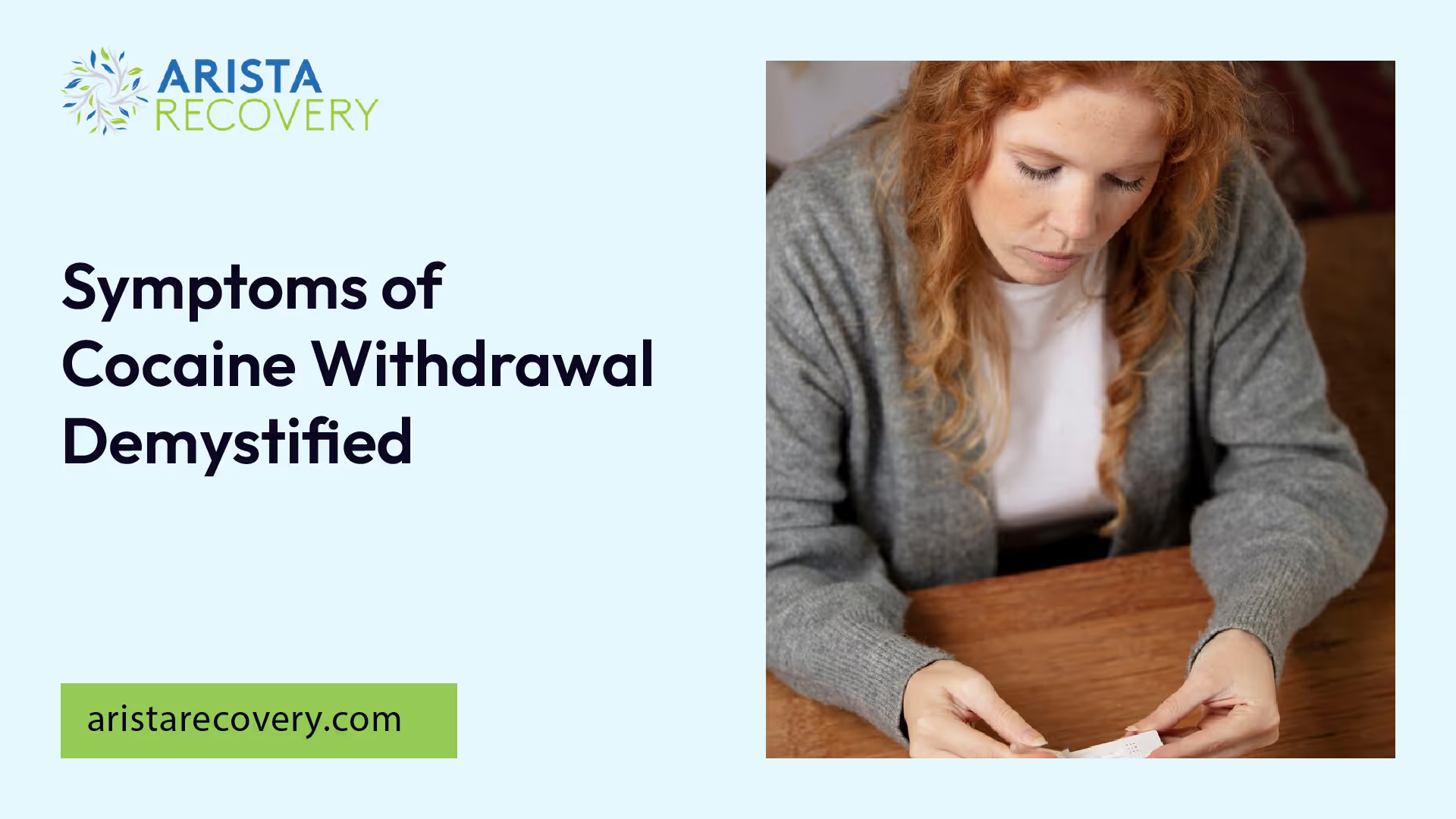Symptoms of Cocaine Withdrawal Demystified

Understanding Withdrawal
Cocaine withdrawal is a challenging phase for individuals who have been using the substance. During this period, they may experience a variety of symptoms as their body adjusts to the absence of the drug.

Symptoms Overview
The symptoms associated with cocaine withdrawal can be numerous and vary in intensity. Common withdrawal effects include:
SymptomsDescriptionFatigueA sense of tiredness and lack of energy.Lack of pleasureAnhedonia or the inability to feel pleasure from normally enjoyable activities.AnxietyIncreased feelings of worry or unease.IrritabilityHeightened sensitivity and agitation.SleepinessAn overwhelming urge to sleep or excessive fatigue.Agitation or SuspicionsFeelings of restlessness or extreme mistrust.
These symptoms may affect an individual's daily life and contribute to the difficulty of overcoming addiction. According to MedlinePlus, withdrawal may include various psychological and physical symptoms that challenge recovery.
Cravings and Depression
Cravings for cocaine can be powerful and persistent during withdrawal. The desire to use the drug may stem from intense psychological and physiological factors. Individuals may find that their cravings for cocaine remain strong even after extended periods without use. These cravings can last for months, especially following long-term heavy use [1].
Depression is another serious concern during cocaine withdrawal. Individuals may experience severe depression characterized by feelings of sadness, hopelessness, and inability to engage in daily life. The emotional lows can be profound, and in some cases, lead to suicidal thoughts [1]. The combination of craving and depression can result in a significant emotional rollercoaster, where the euphoric effects associated with cocaine use diminish, leading to feelings of fear and extreme suspicion instead [1].
This withdrawal process can also be complicated by other serious health issues, including cardiac problems and seizures, that may require medical intervention and detox supervision for the individual's safety and comfort. Understanding these aspects is crucial for recognizing the challenges faced during the withdrawal from cocaine.
Complications and Risks
Cocaine withdrawal can lead to several serious complications and risks that require close attention and management. Among the most concerning are suicidal thoughts and the risk of overdose.
Suicidal Thoughts
During withdrawal from cocaine, individuals often experience intense emotional distress, which can manifest as severe depression and overwhelming negative thoughts. This debilitating dysphoria can increase the likelihood of suicidal ideation or attempts [3]. According to the Oxford Treatment Center, complications such as suicidal thoughts, severe depression, cardiac issues, and seizures may arise, necessitating medical detox and clinical oversight for safety.
The risk of these complications highlights the importance of monitoring individuals undergoing withdrawal. Those experiencing profound negative emotions may resort to substance use as a coping mechanism. This often leads to addiction transfer, where the individual turns to other substances like alcohol, sedatives, or anti-anxiety medications, which may worsen their overall condition.
ComplicationDescriptionSevere DepressionIntense feelings of sadness and hopelessnessSuicidal ThoughtsThoughts of self-harm or suicideCardiac IssuesHeart-related complicationsSeizuresNeurological complications
Risk of Overdose
The risk of overdose during cocaine withdrawal is another critical concern. Individuals may attempt to manage withdrawal symptoms by using cocaine again or mixing it with other substances. This behavior significantly increases the risk of overdose and can result in life-threatening situations.
Withdrawal symptoms can continue for several weeks, leaving individuals vulnerable to relapse. Relapsing on cocaine can be particularly dangerous due to the potential for taking higher doses after a period of abstinence, which raises the likelihood of overdose [3].
Overdose Risk FactorsDescriptionIncreased ToleranceLonger periods of use may lead to higher doses required for the same effect, risking overdoseMixing SubstancesCombining cocaine with other depressants heightens overdose potentialHistory of Substance UsePrevious patterns of use increase risk for relapse and overdose
Addressing these complications during the withdrawal process is vital for safety and recovery. Medical interventions and support should be strongly considered to mitigate these risks.
Managing Withdrawal
Managing cocaine withdrawal requires careful consideration of various strategies to alleviate symptoms. Substance use for relief and medication considerations are two primary aspects of this management.
Substance Use for Relief
During cocaine withdrawal, individuals may be tempted to use other substances to cope with their symptoms, such as alcohol, sedatives, hypnotics, or anti-anxiety medications. While these substances may provide temporary relief, they come with significant risks. Long-term use of these drugs is discouraged, as it may lead to shifting addiction from one substance to another.
The table below outlines some commonly misused substances during cocaine withdrawal and their associated risks:
SubstancePotential RisksAlcoholDependency, liver damageSedativesIncreased sedation, overdose riskHypnoticsDependency, withdrawal symptomsAnti-anxiety medicinesDependency, worsening anxiety
Medication Considerations
Currently, there are no FDA-approved medications specifically for managing cocaine withdrawal. However, certain supportive medications can be employed to address withdrawal symptoms or complications. These may include medications used to treat conditions like insomnia, agitation, and rapid heartbeat during detoxification.
A variety of supportive medications may be considered, as shown in the table below:
SymptomPotential Medication OptionsInsomniaSedative-hypnotics, melatoninAgitationAntidepressants, beta-blockersRapid HeartbeatBeta-blockers, anti-anxiety medicationsHeadacheAnalgesics like ibuprofen or acetaminophen
Research has also investigated medications like modafinil and amantadine for their potential effectiveness in managing cocaine withdrawal symptoms. While these medications may not be officially approved, they may provide comfort during the early stages of recovery. It is essential for these medications to be used under medical supervision to ensure appropriate care and minimize risks [3].
Ensuring proper management of withdrawal symptoms is crucial for individuals seeking recovery from cocaine addiction. By utilizing both supportive substances and medications, a more comfortable withdrawal process can be achieved while maintaining a focus on preventing relapse.
Timelines and Variability
Cocaine withdrawal can be a challenging experience, characterized by a variety of symptoms. Understanding the timelines and variability associated with this process can provide insight into what individuals may encounter during withdrawal.
Onset of Symptoms
The onset of symptoms related to cocaine withdrawal can vary widely among individuals. Typically, symptoms begin within a few hours to days after the last use of cocaine. The specific timeline may depend on factors such as the frequency and duration of use. For example, withdrawal from crack cocaine might start as soon as one hour after the last dose, while symptoms from other forms of cocaine may appear within hours to days.
Type of CocaineTime to Onset of SymptomsCrack Cocaine1 hourOther Forms of CocaineHours to Days
Acute withdrawal symptoms for crack cocaine users usually last about 3-4 days. However, some individuals may experience residual symptoms for an extended period, lasting up to 3-4 weeks. Individuals with more significant withdrawal symptoms face a higher risk of relapse, with those enduring severe symptoms being four times more likely to return to cocaine use [2].
Duration and Factors
The duration of cocaine withdrawal symptoms can also vary by individual. While some may find relief within a few days, others can endure symptoms for weeks or even months. The length and intensity of withdrawal are influenced by various factors, including the type of cocaine used, the frequency of use, and the individual's physical and psychological dependence.
Withdrawal DurationDescriptionShort-termSymptoms may last from several days up to a week.Medium-termSymptoms can persist for several weeks.Long-termSome individuals may experience symptoms for months.
Cocaine withdrawal can be unpredictable, and understanding these timelines helps to prepare individuals for the recovery process ahead. Both physiological and psychological aspects play important roles in the duration and severity of the symptoms experienced during withdrawal.
Medical Interventions
When dealing with the symptoms of cocaine withdrawal, effective medical interventions are critical in ensuring a safe and comfortable recovery process. These interventions often include detoxification programs and the strategic use of medications.
Detox and Monitoring
Severe symptoms associated with cocaine withdrawal may necessitate a live-in treatment program. In these programs, healthcare professionals can provide medications to address the withdrawal symptoms. Constant monitoring of the individual's health and safety is crucial during this recovery phase.
Additionally, various levels of care are available following cocaine withdrawal, including rehab programs that may range in length. These can vary from short-term placements transitioning to outpatient programs, to longer inpatient treatments lasting 30 days to several months.
Intervention TypeLength of ProgramShort-Term RehabVariesOutpatient ProgramsVariesInpatient Treatment30 days - 2-3 months
Medication Options
Although there are currently no FDA-approved medications specifically for managing cocaine withdrawal, healthcare providers may prescribe antidepressants and other medications to alleviate symptoms such as depression and insomnia.
Some researchers have explored the efficacy of medications like modafinil and amantadine for managing the withdrawal symptoms. These medications can provide symptomatic relief for issues such as headaches or insomnia during the early recovery phase [5].
Additionally, propranolol, a beta-blocker, has shown promise in treating patients experiencing severe withdrawal symptoms. This medication can help reduce anxiety, alleviate discomfort caused by cravings, and diminish some of the rewarding effects of cocaine. Clinical trials have indicated that propranolol may improve treatment retention, lessen cocaine use, and extend periods of abstinence [6].
MedicationPurposeAntidepressantsAlleviate depression and insomniaModafinilManage withdrawal symptomsAmantadineManage withdrawal symptomsPropranololReduce anxiety and cravings
Treatment Approaches
Addressing the symptoms of cocaine withdrawal requires a comprehensive treatment approach that includes behavioral therapy and support for recovery.
Behavioral Therapy
Behavioral therapy plays a crucial role in the treatment of cocaine addiction. It focuses on modifying harmful behaviors and developing coping strategies. This type of therapy is effective in addressing the psychological symptoms of withdrawal, such as cravings and depression, which can be intense and long-lasting.
Several methods under behavioral therapy include:
Therapists may also utilize group sessions as part of the treatment plan. These sessions foster a sense of community and understanding among individuals who face similar challenges.
Support and Recovery
Support systems are integral to the recovery process from cocaine addiction. They provide emotional and practical assistance throughout withdrawal and beyond.
Post-cocaine withdrawal, individuals can access various levels of care to address underlying issues contributing to their addiction. This can range from short-term rehabilitation programs to longer inpatient stays, often lasting 30 days or even up to 2-3 months.
Table 1 below summarizes key components of treatment approaches for cocaine withdrawal:
Treatment ComponentDescriptionBehavioral TherapyPsychological methods to modify harmful behaviors. Techniques include CBT, Contingency Management, and Motivational Interviewing.Peer SupportGroup support to share experiences and provide encouragement. Involvement in groups like Narcotics Anonymous is beneficial.Family SupportEngaging family members in the recovery process to provide stability and understanding.Aftercare ProgramsContinued support post-rehabilitation, including therapy and group meetings. Options vary in length and intensity.
With appropriate treatment and support, individuals can recover from the challenges posed by cocaine withdrawal and work towards a healthier, drug-free life.
References
[2]:
[3]:
[4]:
[5]:
[6]:
You’re not alone in this.
When mental health challenges and addiction intersect, it can feel isolating. At Arista, we offer compassionate, evidence-based, and trauma-informed care to help you heal, grow, and move forward.
You’re not alone in this.
When mental health challenges and addiction intersect, it can feel isolating. At Arista, we offer compassionate, evidence-based, and trauma-informed care to help you heal, grow, and move forward.
Support that moves with you.
You’ve taken a brave first step. At Arista Recovery, we’re here to help you continue with best-in-class care designed for long-term healing and support.
.webp)






